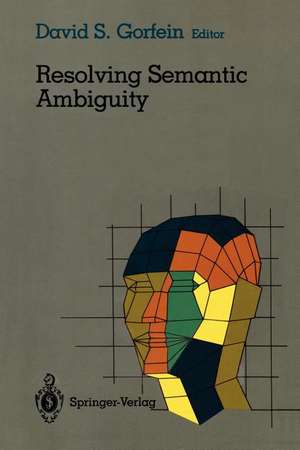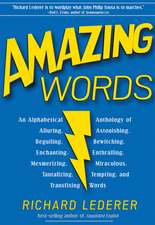Resolving Semantic Ambiguity: Cognitive Science
Editat de David S. Gorfeinen Limba Engleză Paperback – mai 1989
Preț: 648.44 lei
Preț vechi: 810.55 lei
-20% Nou
Puncte Express: 973
Preț estimativ în valută:
124.10€ • 128.57$ • 103.57£
124.10€ • 128.57$ • 103.57£
Carte tipărită la comandă
Livrare economică 21 martie-04 aprilie
Preluare comenzi: 021 569.72.76
Specificații
ISBN-13: 9780387969060
ISBN-10: 0387969063
Pagini: 337
Ilustrații: XII, 337 p. 1 illus.
Dimensiuni: 155 x 235 x 18 mm
Greutate: 0.5 kg
Ediția:Softcover reprint of the original 1st ed. 1989
Editura: Springer
Colecția Springer
Seria Cognitive Science
Locul publicării:New York, NY, United States
ISBN-10: 0387969063
Pagini: 337
Ilustrații: XII, 337 p. 1 illus.
Dimensiuni: 155 x 235 x 18 mm
Greutate: 0.5 kg
Ediția:Softcover reprint of the original 1st ed. 1989
Editura: Springer
Colecția Springer
Seria Cognitive Science
Locul publicării:New York, NY, United States
Public țintă
ResearchCuprins
I Introduction.- 1. Resolving Semantic Ambiguity: An Introduction.- 2. Varieties of Ambiguity: What Are We Seeking?.- II Lexical Access and Post-Access Processing.- 3. What’s in a Context?.- 4. Dynamic Contextual Processes and Lexical Access.- 5. When Does “Soar” Become “Sore”? Some Comments on the Chapter of Simpson and Kellas.- 6. Lexical Ambiguity and Context: An Activation-Suppression Model.- 7. A Context-Sensitive Frequency-Based Theory of Meaning Achievement.- III Representation.- 8. Accessing the Bilingual Lexicon.- 9. On Knowing How Many Entries.- 10. Systematicity and Semantic Ambiguity.- 11. Some Ambiguities in the Study of Ambiguity.- IV Ambiguity in Text.- 12. On the Comprehension of Lexical Ambiguity by Young Children: Investigations into the Development of Mental Modularity.- 13. Disambiguation and Cognitive Control.- V Cognitive Science and Ambiguity: An Overview and Expansion.- 14. Computational Models of Ambiguity Resolution.- 15. Reflexions on Modularity and Connectionism.- References.- Author Index.












